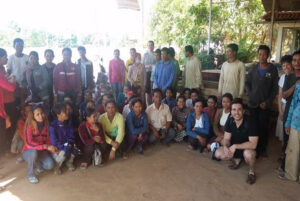This website uses cookies
We use cookies to ensure that we give you the best experience on our website. If you continue to use this site we will assume that you are happy with it.
Students working in Cornell Law School’s Labor Law Clinic traveled to Phnom Penh, Cambodia, this past spring on behalf of a clinic client. Students met with garment workers, interviewed them, and drafted affidavits to be used to challenge the subpar working conditions. The garment workers were all very low-wage workers struggling to improve their working conditions at factories producing clothing for well-known international brands. These workers face challenges on many levels.

The Labor Law Clinic visits Cambodia.
“The number of workers willing to come forward for the case greatly exceeded our capacity. We were taking affidavits back to back and many workers waited hours for the chance to tell their story,” says Professor Angela Cornell, director of the clinic. “Many of the workers had been fired from their jobs for strike activity, others described very challenging working conditions, including long hours, low pay, extreme heat, poor ventilation, exposure to chemicals, lack of safety devices, pregnancy-related terminations, anti-union pressures, blacklisting, and company unions, among other concerns.”
Although clinic students had to take back-to-back affidavits through a translator with two days of work outside in 100 °F temperatures, they found the experience rewarding and eye-opening.
“As the son of two garment factory workers, I jumped at the opportunity to travel to Cambodia to try to improve the working conditions of garment factory workers,” says Paul Rodriguez ’15. “It was evident that Cambodia’s involvement with well-known global fashion brands comes at a price that often includes child labor, worker abuse, and deplorable working conditions…the people of Cambodia are hungry for change and are willing to sacrifice a lot in order to improve working conditions and to receive a salary that affords the basic living necessities.”
“Traveling to Cambodia with the Labor Law Clinic is my favorite law school experience,” says Hillary LeBeau ’16. “It was such an honor to speak face to face with factory workers who risked job loss and physical injury to fight for better wages and working conditions. I truly appreciated the opportunity to hone my legal skills through such an amazing project.”
While there, the students visited the notorious S-21 detention facility, which is now a torture museum that displays the horrors of the Khmer Rouge who ruled Cambodia in the 1970s and were responsible for the deaths of 1.7 million people. The War Crimes Tribunal was also taking place with live testimony of the atrocities. One medic described being removed from a hospital and brought to a detention facility by the Khmer Rouge. Her husband, a surgeon, had been held at the same facility and executed there. Professor Cornell described the testimony as moving and horrifying.